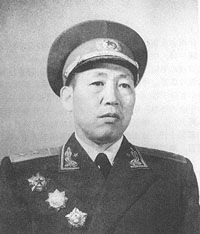Wang Bingzhang | |||||||||
|---|---|---|---|---|---|---|---|---|---|
王秉璋 | |||||||||
 Wang in 1955 | |||||||||
| 1st Minister of the Seventh Ministry of Machine Building | |||||||||
| In office 1965–1971 | |||||||||
| Preceded by | New position | ||||||||
| Succeeded by | Wang Yang | ||||||||
| 1st Chief of Staff of the PLA Air Force | |||||||||
| In office 1949–1958 | |||||||||
| Preceded by | New position | ||||||||
| Succeeded by | Zhang Tingfa | ||||||||
| Personal details | |||||||||
| Born | 14 January 1914 Anyang, Henan, China | ||||||||
| Died | 25 September 2005 (aged 91) Beijing, China | ||||||||
| Political party | CCP | ||||||||
| Military service | |||||||||
| Allegiance | China | ||||||||
| Branch/service |
| ||||||||
| Years of service | 1929−1982 | ||||||||
| Rank | Lieutenant general | ||||||||
| Battles/wars | |||||||||
| Chinese name | |||||||||
| Chinese | 王秉璋 | ||||||||
| |||||||||
Wang Bingzhang (Chinese: 王秉璋; 14 January 1914 – 25 September 2005) was a Chinese Communist revolutionary and a founding lieutenant general of the People's Liberation Army (PLA). He joined the Northwest Army of the warlord Feng Yuxiang in 1929, before participating in the Ningdu uprising and defecting to the Communist Red Army in 1931. He fought in the Red Army's Long March, the Second Sino-Japanese War where he was credited with devising a trench warfare tactic that helped destroy enemy pillboxes, and the Chinese Civil War.
After the founding of the People's Republic of China in 1949, Wang served as the first chief of staff of the PLA Air Force and then the first Minister of the Seventh Ministry of Machine Building, in charge of China's ballistic missile program. During the Cultural Revolution, he replaced Marshall Nie Rongzhen as the acting director of the Science and Technology Commission of the National Defense Ministry, in charge of China's nuclear tests and the launch of its first satellite. However, in the aftermath of Marshall Lin Biao's alleged coup attempt and subsequent death in October 1971, Wang was purged and imprisoned for ten years. He was released in 1981 and discharged from the army without being prosecuted or convicted of a crime.
© MMXXIII Rich X Search. We shall prevail. All rights reserved. Rich X Search
